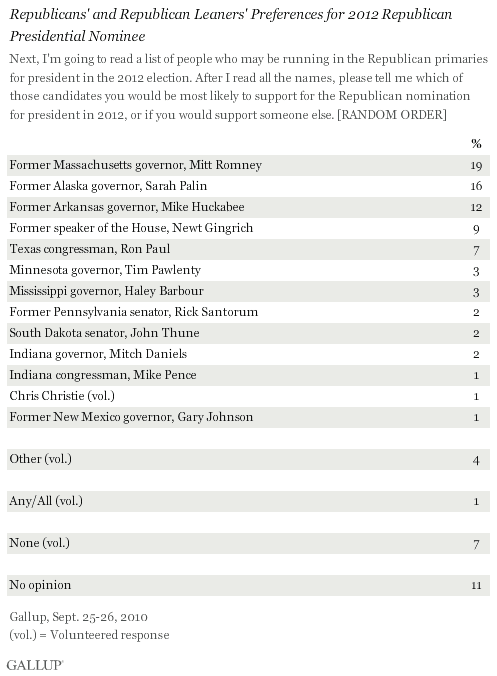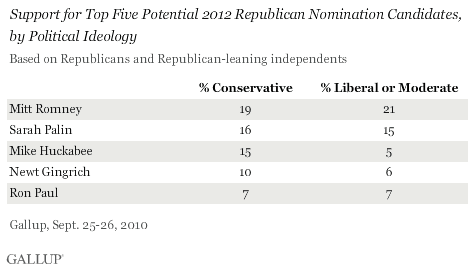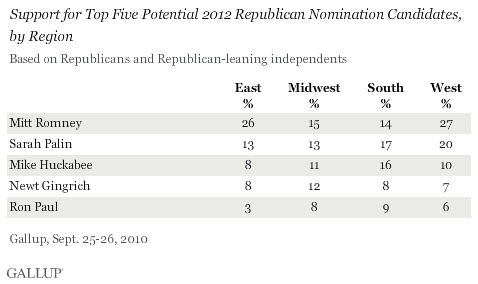PRINCETON, NJ -- Mitt Romney and Sarah Palin lead other potential candidates in Republicans' preferences for the party's 2012 presidential nomination. Mike Huckabee, Newt Gingrich, and Ron Paul also receive more than 5% support from Republicans nationwide.

Gallup, in a poll conducted Sept. 25-26, asked Republicans and Republican-leaning independents which of 12 possible candidates they would be most likely to support for the party's nomination. All 12 candidates are thought to be seriously considering a run for president, and many of them have already visited Iowa and New Hampshire, the states holding the first nominating contests.
In addition to the 12 named candidates, 1% of respondents volunteered the name of New Jersey Gov. Chris Christie. Christie, in his first year as governor of the state, has become a prominent GOP figure, though he is not expected to run for president in 2012.
The current results are similar to prior Gallup polling on the 2012 nomination, using an open-ended format as well as a closed-ended format that offered a shorter list of candidates. Those polls also found Romney and Palin leading, with Huckabee and Gingrich next in line among likely candidates.
Little Ideological Differentiation on Romney, Palin
Romney and Palin are the top choices of both conservative and moderate or liberal Republicans, and in fact their support is similar among both groups. Of the top five candidates, Huckabee receives support that is most divided along ideological lines; he gets significantly more support among conservative Republicans.

Huckabee, an ordained Baptist minister, likely fares better among conservative Republicans because the group tends to be more religious. Among Republicans who say religion is important in their lives, Huckabee (14%) is essentially tied with Romney (17%) and Palin (16%).
Candidates Get More Support in Home Regions
Typically, support for presidential nomination candidates varies geographically, with candidates generally faring best in their home regions. This appears to be the case with most of the current group of GOP contenders, as Palin's support is highest in the West, and Huckabee gets somewhat higher support in the South. Romney shows particular strength in both the East, where he was governor of Massachusetts, and the West, where he served as chief executive of the 2002 Salt Lake City Winter Olympic games.

Bottom Line
Generally speaking, the better-known candidates tend to fare best in early tests of support for presidential nominations. That helps explain why 2008 presidential candidates Romney and Huckabee, 2008 vice presidential nominee Palin, and former House Speaker Gingrich currently generate more support for the 2012 Republican presidential nomination than those who have not previously run for national office or held a high position in national government, such as Tim Pawlenty or Haley Barbour.
Historically, Republicans have generally nominated the early front-runner as the party's presidential candidate. The notable exception came in the last presidential election, when Rudy Giuliani led in most of the early nomination polls but had several poor early primary or caucus showings before withdrawing from the race.
Results for this Gallup poll are based on telephone interviews conducted Sept. 25-26, 2010, on the Gallup Daily tracking survey, with a random sample of 906 Republicans and Republican-leaning independents, aged 18 and older, living in all 50 U.S. states and the District of Columbia, selected using random-digit-dial sampling.
For results based on the total sample of Republicans and Republican leaners, one can say with 95% confidence that the maximum margin of sampling error is ±4 percentage points.
Interviews are conducted with respondents on landline telephones and cellular phones, with interviews conducted in Spanish for respondents who are primarily Spanish-speaking. Each daily sample of national adults includes a minimum quota of 150 cell phone respondents and 850 landline respondents, with additional minimum quotas among landline respondents for gender within region. Landline respondents are chosen at random within each household on the basis of which member had the most recent birthday.
Samples are weighted by gender, age, race, Hispanic ethnicity, education, region, adults in the household, cell-phone-only status, cell-phone-mostly status, and phone lines. Demographic weighting targets are based on the March 2009 Current Population Survey figures for the aged 18 and older non-institutionalized population living in U.S. telephone households. All reported margins of sampling error include the computed design effects for weighting and sample design.
The questions reported here were asked of a random half-sample of respondents for 2 nights on the Gallup Daily tracking survey.
In addition to sampling error, question wording and practical difficulties in conducting surveys can introduce error or bias into the findings of public opinion polls.
View methodology, full question results, and trend data.
For more details on Gallup's polling methodology, visit www.gallup.com.
